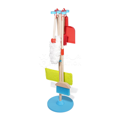Should Children Do Chores? The Montessori Method Says 'Yes!'
Should children do chores? Many parents ponder this question, and the Montessori method has a clear answer: absolutely, yes! Children can learn a lot from doing household chores.
They gain practical skills for caring for themselves, their home, and their family, and they also develop essential life skills that will serve them well into adulthood. When children participate in household chores, they learn how to prepare meals, clean, organize, and even garden.

Doing chores also helps children develop important relationship skills. Through chores, they learn to communicate clearly, negotiate, cooperate, and work as a team. Pretty neat, right?
Wait until you learn that sharing housework can also help families function more smoothly and reduce stress.
So, today, we’ll explore why the Montessori method strongly supports children doing chores and how this practice benefits their development and family life.
The Montessori Philosophy on Chores
In Montessori, chores are called Practical Life activities. Just like how your toddler might start showing interest in getting dressed or cooking, they can also enjoy tasks like cleaning the table, moving laundry, raking leaves, and watering plants.
Practical life skills are a key part of the Montessori curriculum, especially in the early years. This is because they nurture a child’s natural desire to help out and be part of their environment.

Here’s how to introduce chores in a Montessori way, with a touch of humor and a lot of heart:
1. Invite, don’t force:
Invite your child to join the fun! Notice what sparks their interest and give them a thumbs up for their efforts. The goal is to make them feel like they’re the star of the show.
2. Set up for success:
Turn your home into a chore wonderland! Create mini cleaning stations in each room or a special cupboard stocked with child-sized cleaning supplies. Picture tiny spray bottles, little brooms, and pint-sized rags. And remember, keep it safe - natural cleaning solutions only!
3. Be clear and specific:
Skip the “Clean up!” and go for play-by-play commentary. “Let’s pick up the blocks. I’ll hold the basket, and you put the blocks in.” Breaking tasks down makes them as easy as pie – and way more fun.
4. Show, don’t tell:
Demonstrate tasks slowly and without talking, like you’re starring in a silent film. When you do speak, give your little one time to process. Patience and clear actions speak louder than words.
5. It’s ok to make mistakes:
Treat spills like part of the adventure. Stay cool and show your child how to handle the hiccups. If there’s a spill, guide them to grab a towel, wipe it up, and put the towel in the laundry.
Benefits of Children Doing Chores for Children
Introducing children to household chores isn’t just about getting some extra hands on deck. It’s about teaching them valuable life skills and helping them grow into awesome, well-rounded individuals.
Here are some key benefits of children doing chores:
1. Children Realize How Much Parents Do
Ever wish your kids could see how much effort goes into keeping the house tidy? Chores can make them appreciate that there are no housework fairies. By pitching in, they start to see the effort involved and respect what you do.
2. Encouraging Routine
Regular chores help kids learn the beauty of routines. They see that doing certain tasks at certain times helps keep everything running smoothly.

3. Building a Sense of Purpose
Giving kids chores helps them feel motivated and accomplished. When they help around the house, they gain a sense of pride, especially when you praise their efforts.
4. Improving Motor Skills and Learning Value of Work
Tasks like folding laundry or washing dishes are fantastic for strengthening those little hand muscles and improving fine motor skills. Plus, chores are often a child's first "job." They learn the importance of completing tasks on time and doing their best.
They also learn about earning through effort if linked with rewards like pocket money.

5. Teaching Life Skills and Sense of Responsibility
Kids won’t live at home forever, so they need to learn to cook, do laundry, clean, and budget. Starting young makes these skills second nature by the time they’re on their own.
Regular chores help kids become more self-reliant and take pride in their belongings. They learn to handle their own responsibilities, like doing laundry or tidying their room.
6. Making Kids Feel Included and Valued
Giving children responsibilities makes them feel important and valued. They get to prove themselves at home, boosting their self-esteem and showing they’re trusted.
7. Improving Problem-Solving Skills
Chores are great for problem-solving. Kids learn to figure out how to complete tasks, plan, remember instructions, and link their actions to results. This encourages them to take on more complex challenges.

How to Help Your Child Pick Up on Doing Chores
Introducing chores to kids can sometimes feel like herding cats - challenging but not impossible! As parents, we know the importance of teaching responsibility and life skills early on.
But how do you get your child to willingly pick up their socks or tackle the dishes without a battle? Here’s a couple of things to consider:
- End the distractions: Is your child glued to a screen instead of doing chores? Time to hit the off switch! Turn off electronics and keep them off until chores are done.
- Set a time limit: Use a timer to keep track and make it a fun challenge: “Can you finish in 15 minutes?”

- Create a chore structure: Set a specific time for chores. During the school year, evenings work best. In the summer, get chores out of the way in the morning. Make it a rule: no electronics until beds are made, clothes are in the hamper, and rooms are tidy.
- Don’t use chores as punishment: Chores should be seen as a regular responsibility.
But, beneath all of this, it’s important to set clear expectations and integrate chores into a structured routine. That’s the way to go.
And, if you need something special to help your kid learn to do chores the fun way, we've got you covered. Meet the Montessori Cleaning Set.
Montessori Cleaning Set - From Zero to Hero
How come cleaning could be so much fun with this toy? Well, It’s because this toy is pure Montessori magic. It combines play, skill development, and practical life skills all in one.
And guess what? Kids love it because cleaning becomes a fun game!
Teaching responsibility through play? Piece of cake! With this cleaning set, your kid will eagerly clean up after themselves or help out around the house.
Here are a couple of benefits:
- Sweeping and wiping help with coordination and strength.
- Cleaning up messes makes them think critically.
- The repetitive nature of cleaning boosts attention span.
- Early involvement in chores fosters responsibility.
- It’s not just playtime; it’s fun learning.
With this set, you’re giving your child more than just a toy. Actually, you’re helping them build skills for life.
Conclusion:
Incorporating chores into a child's routine is a win-win for families. And, the Montessori method shows strong support for the importance of practical life skills.
By making chores a part of everyday life, children contribute to the household and develop valuable skills that will benefit them throughout their lives. So, what’s your next move? We surely hope it involves Montessori magic and some cleaning tasks.
Free Delivery
Over $80
Easy Returns
No questions asked
Unbeatable Warranty
1-year ++ warranty
- Secure CheckoutWorld’s most secure payment method





